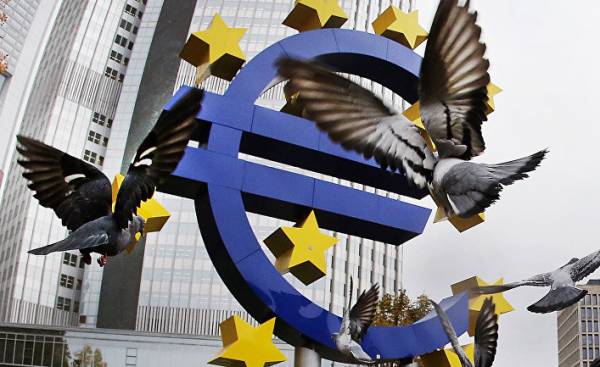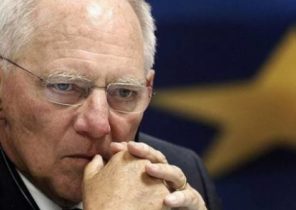
Emmanuel macron wants to reform the Euro area after the rise of the French economy. Angela Merkel ready to support him in the revision of the European agreement if “it would look reasonable.” The President of the Republic did not return empty handed after last Monday’s first visit to the head of the German government. Although Germany still holds the fence and wants to understand whether a new partner to its promises, it is the first time in a long time does not change with the course of the escalation of the Eurozone. It should be noted that it is still visible alarming weakness, which was partly corrected in 2010 (European stability mechanism, the 700 billion Euro and the banking Union), but now no one else, no doubt. European Parliament approves by a bipartisan report (a rare event), which was adopted in February 304 votes (for the most part, liberals, green, socialists and conservatives) in 255 against and 68 abstentions, the need for further and rapid movement to strengthen the Union. We are talking about the Ministry of Finance of the Eurozone with the functions of the European Commissioner for economic and financial Affairs and head of the Eurogroup (sitting Ministers of Finance), the budget of the Eurozone with the possibility of loans turning stability mechanism into a European monetary Fund etc., the French socialist Pervansh Beres (Pervenche Berès) and the German social-Democrat Running Reimer (Reimer Böge), the sponsors of this symbolic of the report (it is not binding), answer questions Libération.
Libération: the Eurozone cannot continue to exist in its current form?
Raymer Running: we All live in a global village, as shown by the financial crisis of 2007. You need to understand that in the future we are waiting and other crises. If we want to resist them, we have no other choice but to strengthen the EU and Euro area, the heart. For this we propose to create the Ministry of Finance to transform the stabilization mechanism of the European monetary Fund (EMF) on the model of the IMF and to create fiscal space to help crisis-torn countries, especially if we are talking about an exogenous crisis. Moreover, they should be open not only to States of the Eurozone.
Pervansh Beres: We have always believed that the balance point is between Germany and France, if the Maastricht Treaty does not allow to cope with crises. We stopped on the way because of the differences in our approaches to economic and budgetary regulation. Although the Eurozone countries managed to bring their economy to move to a single currency, since among them there are differences, despite the stability Pact. Time we did not have the tool of currency devaluation, it was necessary to come up with a mechanism. However, we did not have the courage, we left everything as it was. Payback was a crisis, which found fertile ground here because we have not completed the political construction. We managed to fix the situation, but the situation is still unstable, as we are unable to resolve the dispute between the political Union in the German manner, and the economic government of the French. Therefore, we propose to create for the Eurozone of its own instruments of intervention that can be used in normal times and not just during the crisis.
— Berlin back in 2010 proposed to build the EVF with opportunities for restructuring public debt, but in Paris even do not want to hear about it.
R. B.: the Germans Have a problem with the sharing of risks, and the French — the division of sovereignty…
N. B.: With regard to the division of sovereignty, all see the mote in another’s eye. Because the banking Union case delayed the Germans, not the French.
R. B.: Each side has its own public policy, and this creates disagreements. However, we all recognize the need to strengthen the Eurozone without isolation of the rest of the Union. It is for this are the global reflection on the future of Europe.
P. B.: the Priority is the Euro. Otherwise, the whole EU will collapse. It’s not so popular: we are talking about currency and the economy, not values. When German Finance Minister Wolfgang Schaeuble (Wolfgang Schäuble) launched in 2010 the idea of the EVF, the goal was to prevent political interference. This independent body was to obtain the sole right to approve the program of austerity and restructuring of debt in the recipient country. For France, this was unacceptable. In addition, during that period German and French banks were very much affected by the influence of Greek debt, Paris has encouraged its banks to sell Greek bonds, while Berlin has allowed her to get rid of them. France will continue to oppose the EVF, if it remains just an independent tool without a mechanism of solidarity, that is, the development of a mechanism of solidarity in its most that neither is a punitive form. That is why we put the EVF on automatic stabilizer: a budget for the Eurozone.
R. B.: This is a very important point. If today a country is in crisis and needs help, until a decision is four to five meetings of Finance Ministers and heads of state, on which are battles for domestic political reasons. We need to create opportunities for more independent and automatic actions.
— What can you give a fiscal space of the Eurozone?
P. B.: Raymer wanted we proposed a mechanism in difficult times, a Fund that is accessed when a problem occurs. I suggest to introduce a kind of minimal welfare. We are at an impasse: one does not exclude the other, but Raymer didn’t want to mention my offer. Our consensus was the EVF, which intervenes in the event of a crisis. But it must be accompanied by the creation of a European Treasury, which will have a common view on the situation and resources for preventive intervention. EMF is a firefighter, and the Treasury — the father of the family. EMF comes in the case of an asymmetric shock, while the Treasury operates under a symmetric shock, which applies to all.
R. B.: a New fiscal capacity should not compete with existing regional funds. We take a precautionary approach: it starts with a certain amount, which will change and be filled with the help of contributions from States that still need to be determined. The challenge is to regain the trust. We will show that we are ready to stabilize the Eurozone to support the crisis-ridden country. If nothing is done, we will face a catastrophe.
P. B.: it is Impossible to criticize currency policy, saying that the ECB was exceeding its mandate, according to in Germany, and at the same time to do nothing. Governments need to make lying on them. It is strange that all necessarily want to involve the IMF, but absolutely do not listen to him: in the Fund insist that the Eurozone must have its own budget.
— Budget will benefit all countries in the Eurozone?
P. B.: No, access will be subject to a “code convergence”.
R. B.: Now, a country that has applied for financial assistance, it is easy to blame Brussels and the IMF. It’s time to move past this irresponsible logic. We offer a code of convergence, which must be approved by the European Parliament for five years on the basis of the recommendations included in the Commission countries. It will contain convergence criteria on taxation, employment, investment, productivity, social cohesion, good governance and so Forth, every government itself will choose the best way to achieve your goals.
P. B.: the Code of convergence is an alternative to the stability Pact. The convergence worked in the period when the country was trying to join the Euro zone: each has set its own strategy depending on the tasks based on national consensus. The stability Pact is a policeman, which specifies what to do under threat of sanctions. This approach did not work. You can’t punish a sovereign state. So you need to go back to the pedagogy of the criteria of convergence, to abandon the carrot in favour of stick, of a Eurozone budget.
What amount will there be?
R. B.: we should Start with the reasonable sum, which then will increase it when we can to gain trust. Simply need to accustom people to the new system of solidarity.
P. B.: Stabilization mechanism will be part of the budget, as required by the head of the European Commission Jean-Claude Juncker. 700 billion euros, which it can take account for 5% of Eurozone GDP. The money today is practically not used.
— Do you agree with the European loans for the upcoming fiscal possibilities?
P. B.: the Socialists wanted them to was openly listed. The final wording is more vague, but in the text is the affordability of the loan for the upcoming fiscal possibilities to counteract symmetric crises.
— Overall, you offer a powerful Europe, which relies on the Euro and the single market…
R. B.: Former German Chancellor Helmut Kohl said that the success of monetary Union that must be accompanied by a political one. This is all the more urgent that as said by the German historian Heinrich Winkler (Heinrich Winkler), “we are faced in the West with the conflict of cultures: the culture of European and American revolutions and culture, which embodies the Donald trump”. In other words, we are talking about the conflict of liberalism and anti-liberalism. In other words, if some countries have a problem with that, they can’t afford to slow down much-needed progress. Even if we move forward with different speed. We cannot allow Central-threatened those who were not included.
P. B.: We are not told which joined the EU in 2004, the countries of Eastern Europe that they come in more than one market. Once they only recently regained its sovereignty, we needed to show a lot of pedagogy. Now we have a problem: only 23% of MPs from non-Eurozone countries to have supported our report. However, all that shakes the Euro zone threatens the overall whole. And they will have to make a choice.
R. B.: Do Eastern European countries have the impression that they are second-class citizens, but it is not. If they want to join the Euro zone welcome. In addition, the European budget is proof of the existing solidarity between us: these States each year receive funds in the amount of up to 4% of their GDP. They need to understand that stabilizing the Eurozone is in their interests.
P. B.: During the following Brexton summits of heads of state and governments decided not to talk about the Eurozone: this topic is controversial. But I don’t see how you can avoid it if we want to give impetus to the development of the EU.
R. B.: no More time to waste. The report says that the Parliament is committed to stabilize the system. Otherwise it will collapse. And it’s not called a viable alternative.
The election Rules, apparently, has given impetus to a Franco-German dynamics.
P. B.: it is Impossible to let it go. The Makron will have to convince Merkel that he is not seeking concessions to France and the Chancellor herself is interested in this. A source of danger would be the adoption, as a first step, to strive, German Finance Minister Wolfgang Schaeuble: control over budget discipline on the part of “independent” body. You need to maintain a balance between responsibility and solidarity, investment and reforms. Macron needs to achieve such a global approach.







